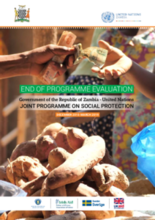Social protection programmes are an essential safety net for poor and vulnerable populations in Zambia where poverty levels are high with a Gini coefficient of 0.69. An estimated 54.4% of the population are poor, 76.6% of whom are found in rural areas and 40.8% are categorized as extremely poor. Shifting climatic conditions that affect crop production, food shortages and rising commodity prices, make the poorest segments of the population more susceptible to shocks and this reduces their ability to have access to basic social services such as health and education.
In order to promote a coordinated multisectoral response towards improving the livelihoods and welfare of those most vulnerable to potential environmental shocks, the Government of the Republic of Zambia implements different social protection programmes through the National Social Protection Policy (NSPP), as a means of sustainable poverty reduction. Nevertheless, effective implementation of these programmes and projects has been hampered by inadequate resources, poor coordination and poor targeting mechanisms.
The UN Joint Programme on Social Protection was designed to provide technical assistance to different line ministries in implementing the policy so as to ensure effective delivery of social protection programmes in Zambia. The participating institutionsof the UNJPSP were UNICEF, ILO, IOM, WFP, FAO and Ministries of Community Development and Social Services, Labour and Social Security, Home Affairs, Health, Youth, Sports and Child Development, General Education, Agriculture, Fisheries and Livestock, Finance and the Zambia Agency for Persons with Disabilities. The aim of the programmme was to reduce the number of households and individuals living in poverty, suffering from deprivation and/or vulnerable to shocks of different nature.” Its ultimate goal was to increase the demand and utilization of social protection services within the country through expanding social protection coverage, strengthening integrated delivery system and enhancing communication to raise awareness and create political climate willing to support social protection programmes. The Joint Programme brought together different actors within the social protection sector and implementation was overseen by the Steering Committee chaired by Government and the UN, and comprising Cooperating Partners and national implementing partners. The programme begun implementation in December 2015 and ended in March 2019 with funding from Cooperating Partners amounting to $11,495,397.94.
This report details the end of programme evaluation, which was a comprehensive assessment of the UNJPSP’s performance. The main purpose of the evaluation was to conduct a systematic evaluation of UNJPSP programme results as a way of understanding and assessing its operational context and the effect the technical assistance had on the implementation of NSPP during the programme’s lifetime.

